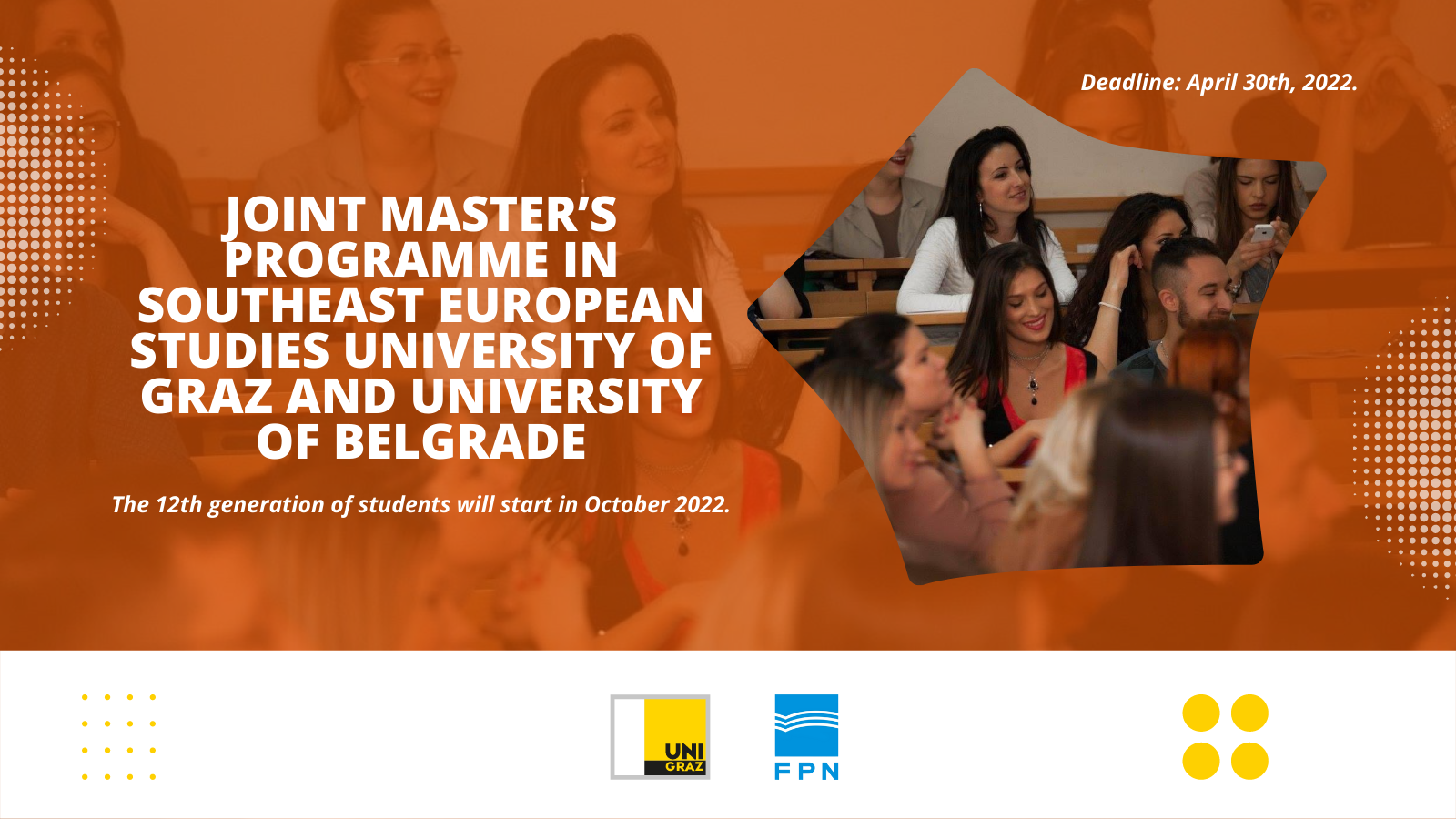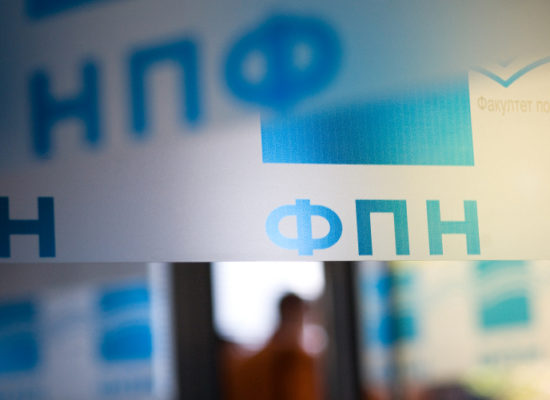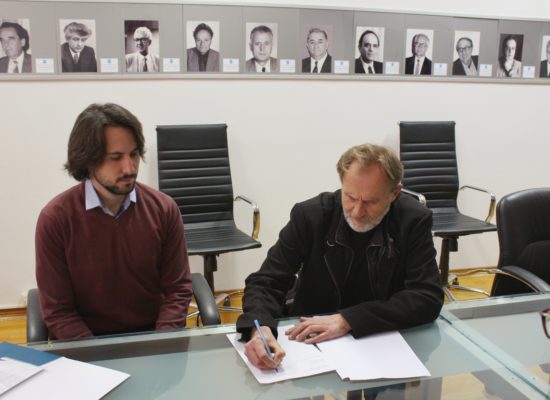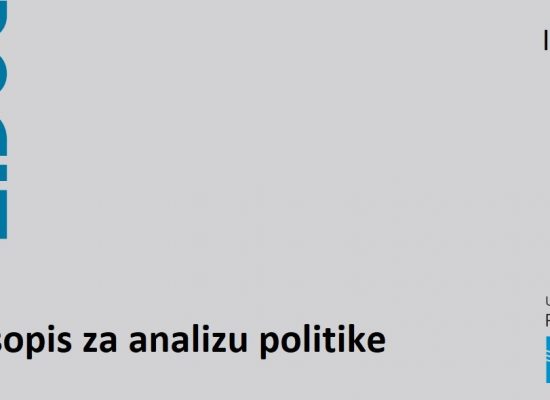
Call for Applications 2022/2023: Joint Master’s Programme in Southeast European Studies University of Graz and University of Belgrade
Deadline: April 30, 2022
The University of Graz and the University of Belgrade – Faculty of Political Sciences (FPS) are pleased to announce the call for applications for the academic year 2022/2023 for the Joint Master’s Programme in Southeast European Studies (www.jointdegree.eu/masees & www.seestudies.eu).
This two-year MA programme is conducted in English as a Joint Programme with an obligatory study abroad period. The 12th generation of students will start in October 2022.
Students enroll in and spend the first year at the chosen entrance university (Graz or Belgrade). In the second year, students spend at least one semester on mobility at a partner university.
Students with entrance university Belgrade may spend their mobility at the:
- University of Graz, Austria
Students with entrance university Graz may spend their mobility depending on their focus area at the following partner universities:
- University of Belgrade, Serbia (Law and Politics)
- Ss. Cyril and Methodius University, Skopje, North Macedonia (Law and Politics)
- University of Bologna, Italy (Law and Politics)
- University of Ljubljana*, Slovenia (History / Law and Politics)
- University of Novi Sad, Serbia (History)
- University of Sarajevo, Bosnia and Herzegovina (Law and Politics)
- University of Zagreb, Croatia (History / Law and Politics)
- University of Regensburg, Germany (History / Law and Politics)
- Babes-Bolyai University Cluj-Napoca, Romania (History)
- University College London, UK (Law and Politics)
- Central European University, Vienna, Austria (Law and Politics)
*Double Degree between the University of Graz and the University of Ljubljana:
The double degree option is available to students with entrance university Graz within the “law and politics” track who are interested in a mobility at the University of Ljubljana.
Why Southeast European Studies in Graz?
Southeast Europe has been a focus of the University of Graz for over a century. The noble prize winner Ivo Andrić wrote his PhD in Graz and many scholars and prominent intellectuals from the region have studied here. Since the early 1990s thousands of students from across the Balkans have decided to study at the University of Graz and it is today not unusual to hear Bosnian/Serbian/Croatian and Albanian in addition to German and English in the hallways of the university. Only two hours from Ljubljana and Zagreb, the city is close to Southeast Europe and the dense ties to the region are tangible throughout the city, from the cultural life to the social scene.
Over the past decades, the University has had a strong academic interest in history of Southeast Europe, in particular historical anthropology. Various exchange programmes, teaching, research and public events on the region have a long tradition. The Centre for Southeast European Studies is not only coordinating the Master’s Programme, but also the Doctoral Programme Law and Politics as well as the PhD Programme Southeast Europe. In addition, the Centre hosts regular public events, workshops, conferences and conducts research on Southeast Europe.
Students are thus not just offered studies on Southeast Europe, but are part of a vibrant community of scholars and students interested in, and from, Southeast Europe.
For further information on the programme in Graz check out:
http://www.jointdegree.eu/en/masees/
Check out the video with some impressions from the former students at the University of Graz (link: VIDEO).
Why Southeast European Studies in Belgrade?
You will be studying Southeast Europe in its very centre. In this way, you will be able not only to better understand your chosen field of interest, but also to learn one or more languages of the region. Secondly, you will profit from learning in a group of outstanding FPS and foreign professors with excellent academic records and long-time expertise in Southeast Europe. Student groups usually consist of the people from the region but also from other parts of the world. You will be able to share an exciting social life in Belgrade with them. Check some impressions of our previous generation of students: http://www.seestudies.eu/node/48.
During two semesters in Belgrade you will also be able to get involved in the work of the FPS Centre for Interdisciplinary Studies on the Balkans (CisBalk). As an extension of the Master Programme and a focus point of cooperation of Serbian and international experts dealing with Southeast Europe, the Centre offers ample possibilities for engagement in research projects, workshops and numerous public events it organizes.
Content of the Programme
The mission of the Joint Master Programme in Southeast European Studies is to provide an international and interdisciplinary master programme in social sciences and humanities of highest quality, which enables participants to effectively understand the interrelationship between law, politics, economics, history and culture with strong emphasis on the region of Southeast Europe.
While Belgrade is running the joint interdisciplinary programme, in Graz the programme offers two focus areas, one in Southeast European History and one in Law and Politics in Southeast Europe. In both versions, the programme promotes the capacity for academic analysis, especially by applying an inter- and transdisciplinary approach which includes areas of legal, political, economic and cultural studies. In the first year, core courses include introduction to interdisciplinary approaches, seminars in political science and law, history, economics and cultural studies in Southeast Europe. The programme aims at strengthening and understanding the role of gender in academia, society and politics.
All compulsory courses are conducted in English, but students are able to take classes in other languages. Language acquisition is an important key aspect of the joint degree and students are encouraged to take courses in a regional language and/or the predominant language of their mobility institution.
Thus, students benefit from a highly internationally oriented programme with a mandatory mobility period included.
Mobility semester
In the second year, students attend at least one semester on mobility at one of the partner universities and specialize in their desired field.
There are also optional provisions in place to offer students professional trainings and internship positions. In the final semester students write a master thesis reflecting their capacity to work on a scientific subject independently.
Student Assistantships at the Centre for Southeast European Studies
Students enrolled at the University of Graz will have a possibility to apply for one of the studentship positions offered by the Centre for Southeast European Studies.
Academic Degree
Students completing the Joint Master’s Programme in Southeast European Studies earn the degree “Master of Arts”, abbreviated MA.
Admission
The Joint Master’s Programme in Southeast European Studies welcomes applicants who hold an academic degree of at least 180 ECTS credits (bachelor’s degree or equivalent), who can demonstrate their basic knowledge of social sciences or humanities — law, political, history, social, cultural or economic sciences — and who have general insight and interest in Southeast Europe.
The APPLICATION should include the following:
- Curriculum vitae (English)
- Copy of passport (ID page with photograph)
- Proof of proficiency in English language: IELTS (required minimum score: 6.0), a TOEFL (required minimum score: 210 on the computerised test, 547 on the paper-based test, 78 on the internet-based test), a Cambridge Exam (required level: FCE) or an equivalent certificate. Students with a test after the deadline for application but before the date of admission can be conditionally accepted to the programme. Applicants who are English native speakers and those who successfully completed an English-taught bachelor programme do not have to undergo a test.
- At least one signed letter of recommendation (preferably from a university professor or employer, in English)
- Motivation statement (English)
- Certificate/diploma obtained at the undergraduate level (for Graz: translated into English or German; for Belgrade: translated into English if it is not in one of the Ex-Yugoslav languages)
- Transcript of records obtained at the undergraduate level (for Graz: translated into English or German; for Belgrade: translated into English if it is not in one of the Ex-Yugoslav languages)
- Diploma Supplement (if applicable)
For enrolling at the University of Belgrade, certified translation of diploma and transcript of records from non-ex-Yu languages into Serbian shall be required additionally.
Applicants should apply online via this platform:
Tuition Fee
Tuition fees have to be paid to the respective entrance university. Students completing the obligatory semester abroad as part of the master’s programme are not charged any further tuition fees provided they pay their fees at their entrance university.
Local fees and health insurance provisions may vary per institution and have to paid during the mobility period as well.
University of Belgrade:
€3,900 EUR (or counter value in Serbian dinars), including ALL costs of a four-semester studying, costs of recognition of foreign BA degrees and the summer/winter school – payable in ten installments – for citizens of Albania, Bosnia and Herzegovina, Bulgaria, Croatia, Macedonia, Montenegro, Romania, Serbia and Turkey.
€4,900 EUR (or counter value in Serbian dinars), including ALL costs of a four-semester studying, costs of recognition of foreign BA degrees and the summer/winter school – payable in ten installments – for citizens of all other countries.
University of Graz: Tuition Fee – Academic Affairs (uni-graz.at)
Scholarship
The consortium does not provide any scholarships for the entire programme.
Scholarships for the mobility semester have to be applied for at your entrance university (never at the mobility university). Make sure to contact the Joint Programme contact person well in advance regarding your scholarship options (subject to change).
University of Belgrade: Please note that the University of Belgrade is not in a position to provide financial support, but we encourage students to seek available funding from third parties. For more information, please contact gordana.ristic@fpn.bg.ac.rs and dusan.pavlovic@mac.com
Universtiy of Graz: Please take a look at http://www.grants.at/
The deadline for applications is April 30th, 2022.



